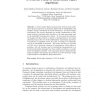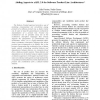4628 search results - page 75 / 926 » Eliciting information for product modeling using process mod... |
SC
2009
ACM
14 years 2 months ago
2009
ACM
Proponents of utility-based scheduling policies have shown the potential for a 100–1400% increase in value-delivered to users when used in lieu of traditional approaches such as...
SIGIR
2002
ACM
13 years 7 months ago
2002
ACM
In this paper, we present the AutoCat system for product classification. AutoCat uses a vector space model, modified to consider product attributes unavailable in traditional docu...
ECMDAFA
2010
Springer
13 years 5 months ago
2010
Springer
Abstract. Current mobile digital communication systems must implement rigorous operations to guarantee high levels of confidentiality and integrity during transmission of critical ...
NAACL
2010
13 years 5 months ago
2010
In a supertagging task, sequence labeling models are commonly used. But their limited ability to model long-distance information presents a bottleneck to make further improvements...
VAMOS
2007
Springer
14 years 1 months ago
2007
Springer
The Feature–Oriented approach provides a way of modelling commonalities and variabilities among products of a software product line. A feature model can be used as input for gen...


